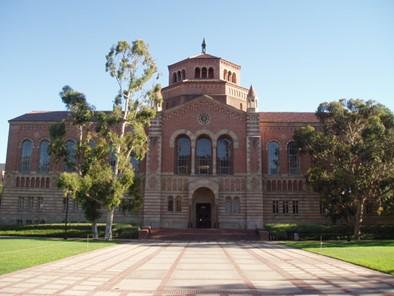Teamwork Makes the Project Work: Highlighting Collaborative Work in Humanities Collections and Reference Resources

A sunset over Rochester, NY
Image courtesy of Patrick Ashley, CC BY 2.0, via Wikimedia Commons

A sunset over Rochester, NY
Image courtesy of Patrick Ashley, CC BY 2.0, via Wikimedia Commons
Maddy Casey is an MsLIS student at the Pratt Institute studying digital humanities, data, and equity in libraries. As a 2024 intern with the Division of Preservation and Access, she contributed to a research project exploring the long-term sustainability of projects in the Humanities Collections and Reference Resources program.
When developing any collections-based project, gathering a team of participants with diverse expertise, interests, and perspectives can significantly enhance the project’s output. Oftentimes, assembling a project “dream team” can mean breaking out of institutional silos and developing multi-institutional teams or networks. The Humanities Collections and Reference Resources program (HCRR) provides funding to libraries, archives, museums, and historical organizations across the country that seek to preserve or increase access to significant humanities works. The program advances public and scholarly engagement with the humanities by funding projects that digitize or describe collections, as well as projects that synthesize and codify materials into reference resources. The program encourages collaboration across institutions, and between stakeholders including humanities scholars, information science professionals, and community members.
In addition to fostering a range of perspectives among participants, thoughtful, collaborative work can also enhance project sustainability by expanding the network of dedicated contributors who are committed to a project long-term. This blog post highlights some of the projects from HCRR’s past that have taken advantage of the affordances of the grant program to facilitate collaborative work.
These projects showcase many ways in which bringing in additional partners can enhance the reach of a project and its long-term availability. Ultimately, sustainability is as much a factor of human support as it is a question of methodologies. As shifts in priorities, structures, and infrastructure occur, partnerships between institutions or with community members can ensure that new participants can share responsibility for a project and support its continued preservation across time.
The American Soldier in WWII makes freely available online more than 65,000 handwritten responses to questionnaires distributed by the U.S. Army to soldiers during World War II. The project transcribed open-ended responses and reunited them with short answer and multiple-choice responses to build a comprehensive digital project on soldiers’ wartime experience. A collaborative effort based at Virginia Tech, the project has worked with a number of groups and participants, including staff from the Roper Center for Public Opinion Research at Cornell University, who provided feedback on available options for data storage and converted data from the multiple-choice sections of the survey from ASCII to more user-friendly data file types. Outside of the scope of the NEH grant, staff at the National Archives and Records Administration (NARA) digitized the open-ended questionnaire responses, promoted the project’s transcription drive, and hosted a transcription drive through the NARA Citizen Historian Hub. After working with a team from Zooniverse to set up a prototype, the project also engaged a network of volunteer transcribers, who wrote and reviewed transcriptions of the open-ended questionnaire responses. Additionally, the Social Science Resource Council, VT Publishing, HathiTrust Digital Library, Princeton University Press, and the George C. Marshall Research Library, partnered with the project to make relevant reports and books connected to the project freely available online. In addition to making the project possible, these coordinated efforts from numerous partners expanded the collection’s reach to broad networks of interested viewers. The combined expertise, efforts, and commitment of contributors provided a framework for students and volunteers to engage with the individual experiences of WWII soldiers through transcription work, strengthened the collection, and helped address technical challenges and concerns around open access.
Originally going live in 2004, the New Georgia Encyclopedia represents one state’s efforts toward the massive undertaking of developing a free, accessible, and comprehensive digital reference resource. The project is a partnership between the Georgia Humanities Council, the Office of the Governor of Georgia, University of Georgia Press, and the University System of Georgia/GALILEO (GA Library Learning Online). New entries are created and edited by scholars and fact-checked by reference librarians from the University of Georgia. Over the 20 years the project has been publicly available, a number of libraries, archives, and other organizations have also contributed content and expertise to the encyclopedia. The project is representative of the affordances of digital reference resources: their ability to be updated easily, developed collaboratively, and revised over time. The digital encyclopedia also includes a feedback form for each entry, which allows users to flag entry issues or potential errors. In addition to facilitating updates to the resource, this feature also allows the users to share their knowledge and perspectives with the project and contribute to the shape and content of the encyclopedia, ensuring its accuracy and a sustained audience over time.
Rochester, New York Voices of LGBT History
From 2017–2018, the University of Rochester River Campus Libraries collaborated with the Gay Alliance of Genesee Valley (since reconfigured as the Rochester Rainbow Union) to pilot a digital archive project, Rochester, New York Voices of LGBT History, through an NEH HCRR planning grant. The project digitized, transcribed, closed-captioned, and produced metadata for more than 200 recordings from two collections of oral histories and radio recordings representing a snapshot of the lived experiences of the Rochester LGBT community from the 1970s through the early 2010s. While the Gay Alliance of Genesee Valley has undergone organizational restructuring and renaming in the time since the grant period, the collection itself has remained consistently available via the University of Rochester Library’s portal. The project exemplifies the ways in which a university library can harness its institutional expertise and dependability to support the work of a smaller institution. In addition to providing consistent access to the digitized collection, the project team produced a white paper documenting the process of working with a local community organization. Beyond the sustained access to the collections, which the project ensured, the white paper also models a key way in which collaborative projects can provide valuable insights for future work, thus enabling a different avenue for the results of a collections project to continue to serve the stewards and public audiences for humanities collections for years to come.
The Strachwitz Frontera Collection
The Strachwitz Frontera Collection is a long-term collaborative project between the Arhoolie Foundation, UCLA Digital Library, and the UCLA Chicano Studies Research Center. The project has digitized more than 125,000 songs recorded in the United States and Mexico between 1904 and 1994. The partnership brings together the Arhoolie Foundation’s collection, subject matter, and audiovisual material expertise, and UCLA’s digital library know-how, to digitize, store, and provide access to the collection across two decades of collaboration. Building upon collection cataloging procedures developed over the course of the project, Arhoolie Foundation staff conducted digitization of phonograph records and cassette and reel-to-reel tapes, leveraging their expertise in audiovisual formats and in the value of the collection’s materials. UCLA’s Digital Library staff were able to make the digitized collection broadly available using the experience they developed building sustainable and accessible digital library projects. By working together, the project’s team have also made use of each partner’s networks to reach a wide audience of students, researchers, and the original performers behind the collection and their families. Team members from each organization have participated in project “spin-offs” outside of the scope of NEH funded project stages that speak to their distinct missions, expertise, and roles. For example, UCLA staff developed an exhibition highlighting the collection for students and featured the collection in curricula, whereas the Arhoolie Foundation produced a blog highlighting key figures and themes from the project and produced interviews with the musicians and producers featured in the collection.
Across the field of cultural heritage work, institutions are confronting manifold obstacles as they navigate preserving and providing access to their collections, from austerity to rapidly evolving technological complexity. As these projects demonstrate, breaking out of institutional silos and engaging in collaborative work serves as a model rife with potential for project sustainability and growth through these challenges.
